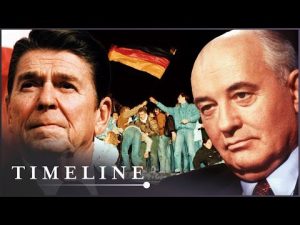Yet to figure out Why Did The Soviet Union Collapse? Well,The Soviet Union collapsed due to a combination of economic mismanagement, political turmoil, nationalist movements, military overextension, and ideological erosion, each contributing to the unraveling of this once-mighty superpower.

The demise of the Soviet Union remains a pivotal chapter in global history.
Join us in comprehending the profound reasons behind the Soviet Union’s collapse, offering insights into the lessons learned from this transformative event.
In this comprehensive exploration, we delve into the ten primary reasons that intricately contributed to the collapse of this once-mighty superpower.
Why Did The Soviet Union Collapse? Find 10 Reasons
Economic Mismanagement
The Soviet Union’s economic downfall was marked by inefficiency, central planning failures, and an inability to adapt to a rapidly changing global market. The command economy model struggled to keep pace with the dynamic nature of capitalism, leading to resource misallocation and ultimately, economic stagnation.
Political Turmoil
The political landscape played a crucial role in the Union’s unraveling. Internal power struggles, coupled with the burden of maintaining an extensive satellite state network, strained the political fabric. Gorbachev’s attempts at reform, like perestroika and glasnost, proved too little, too late.
Nationalist Movements
Ethnic tensions and burgeoning nationalist sentiments within the various Soviet republics sowed the seeds of disintegration. The desire for self-determination and independence fueled movements across regions, weakening the centralized authority in Moscow.
Military Overextension
The USSR’s expansive military ambitions, particularly its involvement in the costly Afghan War, strained resources and exacerbated economic woes. The military focus diverted funds from essential domestic needs, contributing to the overall decline.
Ideological Erosion
The ideological foundation of communism eroded over time. Citizens grew disillusioned with the promised utopia as the stark realities of economic struggles and political oppression became evident. This ideological disillusionment weakened the social fabric that held the nation together.
Technological Lag
Failure to keep pace with technological advancements left the Soviet Union technologically inferior on the global stage. The information age dawned, and the USSR found itself lagging behind in the race, impacting its global competitiveness and ability to adapt.
Environmental Neglect
Environmental degradation, largely stemming from rapid industrialization without proper ecological considerations, led to severe consequences. The Chernobyl disaster exemplified the catastrophic effects of environmental neglect, eroding public trust in the government’s ability to ensure safety and well-being.
Glasnost Backlash
While Gorbachev’s policy of glasnost aimed at openness and transparency, it inadvertently unleashed a wave of discontent. The newfound freedom of expression empowered dissenting voices, contributing to an uncontrollable wave of public criticism and demands for change.
Economic Diversification Failure
The over-reliance on oil and gas exports left the Soviet economy vulnerable to global market fluctuations. A lack of economic diversification strategies made the nation susceptible to external economic pressures, hastening its decline.
Lack of Political Will
Ultimately, a lack of decisive political will to address systemic issues and enact meaningful reforms played a pivotal role in the Union’s collapse. The inability to adapt to changing circumstances and confront the deep-seated problems led to the eventual disintegration of the Soviet Union.
Frequently Asked Questions: Why Did The Soviet Union Collapse?
1. What were the key economic factors contributing to the collapse of the Soviet Union?
The collapse was propelled by economic mismanagement, inefficiency, and an inability to adapt to the global market, leading to stagnation.
2. How did political turmoil play a role in the downfall of the Soviet Union?
Internal power struggles and the challenge of maintaining a vast satellite state network strained the political fabric, hastening the Union’s unraveling.
3. What role did nationalist movements play in the collapse?
Ethnically driven tensions and the desire for self-determination within Soviet republics fueled movements seeking independence, weakening central authority.
4. How did military overextension contribute to the demise?
The USSR’s expansive military ambitions, notably in the Afghan War, strained resources, diverting funds from essential domestic needs and exacerbating economic issues.
5. In what way did ideological erosion impact the collapse?
The ideological foundation of communism eroded as citizens grew disillusioned with economic struggles and political oppression, weakening the social fabric.
6. What role did technological lag play in the Soviet Union’s decline?
Failure to keep pace with technological advancements left the USSR technologically inferior globally, impacting its competitiveness and adaptive capacity.
7. How did environmental neglect manifest in the collapse?
Rapid industrialization without ecological considerations led to severe consequences, exemplified by the Chernobyl disaster, eroding public trust.
8. What backlash resulted from Gorbachev’s policy of glasnost?
The newfound freedom of expression empowered dissenting voices, contributing to an uncontrollable wave of public criticism and demands for change.
9. How did the lack of economic diversification impact the Soviet economy?
Over-reliance on oil and gas exports left the economy vulnerable to global market fluctuations, intensifying external economic pressures.
Conclusion
The collapse of the Soviet Union was a complex interplay of economic, political, and social factors. Understanding these intricacies is paramount to comprehending this significant historical event. As we reflect on the lessons learned, it becomes clear that adaptability, foresight, and responsiveness are key pillars for any nation’s enduring strength in the face of evolving global dynamics.
Recent Posts
Finding reliable suppliers is essential for aviation operators searching where to buy Jet Fuel A1 in Romania because fuel quality directly affects aircraft safety and engine performance. Romania has...
Romania’s strategic location in Eastern Europe, access to the Black Sea, and developed refinery infrastructure have made it a key jet fuel export hub in the region. In 2025, Romania exported over...